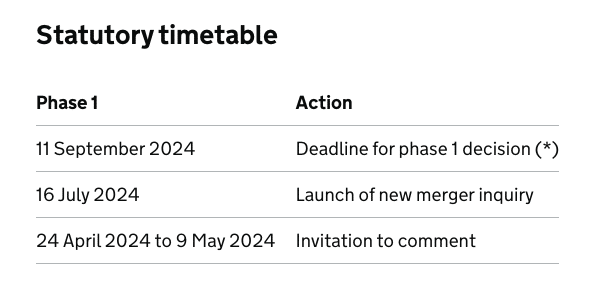The United Kingdom’s Competition and Markets Authority (CMA) has launched an antitrust investigation into Microsoft’s recent hiring of key executives and employees from Inflection AI.
The move responds to growing concerns about potential anti-competitive behavior among tech giants that are using their vast resources to scoop up nascent AI firms to quickly become the dominant force in this industry.
This new investigation adds to a series of actions taken by regulators worldwide against Microsoft (MSFT), which include not only artificial intelligence but also reviews of its acquisitions in the gaming and cloud services sectors by the CMA and the U.S. Federal Trade Commission (FTC) in the past.
On July 16, 2024, the CMA officially announced the beginning of a formal phase 1 merger inquiry into Microsoft’s hiring of certain former employees of Inflection AI.
The investigation will focus on determining if these actions constitute a relevant merger situation under UK law and if they could result in a substantial lessening of competition in the AI market.
The CMA has set a deadline for September 11, 2024, to decide whether to escalate the investigation to a more in-depth phase 2 probe. This initial 40-working day period will involve gathering evidence and assessing the potential impact of Microsoft’s actions on the country’s AI sector.
Background: Microsoft’s Acquisition of Inflection AI Talent

The CMA’s investigation is announced just a few months after Microsoft announced that it was creating a new AI research department headed by the founders of Inflection AI – Reid Hoffman (founder of LinkedIn) and Mustafa Suleyman.
Multiple other staff members from the AI company also joined Microsoft’s ranks. From a practical standpoint, this makes the transaction look more like a merger where all interests from Inflection AI, including its staff, are being absorbed by the acquirer.
Microsoft agreed to pay Inflection AI $650 million to access its advanced AI software. Some have categorized the transactions as an “acquihire” as a formal acquisition was not completed but all of the steps that would be involved in one have been taken.
Legal experts and industry watchers warn that Microsoft’s goal could be to circumvent M&A laws to access the technology created by Inflection AI without raising regulators’ eyebrows. However, if that was the objective, they seem to have failed.
The European Commission and FTC Are Also Scrutinizing AI Investments
The CMA has been increasing its efforts to make sure that the AI industry can grow organically and that innovation among small and mid-sized firms is adequately protected by preventing tech giants from acquiring threatening products, software, or services that could disrupt some of their well-established business segments.
In the past few years, the regulator has identified over 90 corporate actions including partnerships and strategic investments in the AI sector that could be used by these large corporations to protect their interests.
Joel Bamford, Executive Director of Mergers at the CMA, emphasized the importance of this investigation, stating: “Foundation Models have the potential to fundamentally impact the way we all live and work, including products and services across so many UK sectors – healthcare, energy, transport, finance and more.”
He stated: “Open, fair, and effective competition in Foundation Model markets is key to ensuring that everyone in the UK, along with our broader economy, fully benefits from this change, especially since technology plays a major role in growth and productivity.”
The CMA is not alone in this effort. Regulators around the world are closely examining AI partnerships and strategic agreements. These have been some of the most notable actions taken by agencies in other regions.
- The European Commission is assessing competition in ‘virtual worlds’ and generative AI and has requested key information from large and well-established players in this space to examine market dynamics in this space.
- The US Federal Trade Commission (FTC) has opened an inquiry into generative AI investments by technology companies and is actively investigating if these investments and partnerships are distorting the market and undermining fair competition.
The CMA is also receiving feedback from stakeholders who are affected by Microsoft’s partnership with OpenAI and is waiting to process the information it gathered from the two companies.
Moreover, the United States FTC has opened inquiries against this same partnership and also on NVIDIA amid the company’s dominance of the AI chip market.
Microsoft Claims that the Transaction Should Not Be Treated as a Merger
“We are confident that the hiring of talent promotes competition and should not be treated as a merger. We will provide the UK Competition and Markets Authority with the information it needs to complete its inquiries expeditiously,” Microsoft said in a statement addressing the CMA’s announcement of the new proceeding.
The outcome of this investigation could have significant implications for tech giants and how they approach talent acquisition and partnerships in the AI sector moving forward. It may also set precedents for future regulatory actions in this rapidly evolving field.
The CMA’s investigation could lead to several outcomes:
- If the CMA concludes that Microsoft’s actions do not constitute a relevant merger situation or do not raise competition concerns, it may clear the deal without taking further action.
- If the initial concerns prove to be valid upon assessing the scope and reach of the agreements, the CMA could refer the case for a more in-depth phase 2 investigation, which could last up to 24 weeks (extendable by up to 8 weeks in certain circumstances).
- In case there are serious concerns about the implications of Microsoft’s actions, the company might be required to offer remedies to address these issues to avoid a phase 2 reference.
Also read: UK’s CMA Opens Inquiry Into Microsoft-OpenAI Partnership Amid Control Concerns
These investigations reflect growing concerns about the concentration of power in the AI industry and the potential for established tech giants to dominate this crucial emerging technology.
The CMA’s antitrust probe into Microsoft’s acquisition of Inflection AI talent highlights the complex challenges that regulators currently face as they try to foster innovation in the AI industry while maintaining fair competition in a rapidly evolving sector.
As the investigation unfolds, it will likely set relevant precedents for how similar cases are handled in the future and could potentially reshape the landscape if these partnerships are ultimately considered harmful to the sector’s growth.
